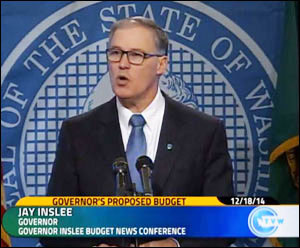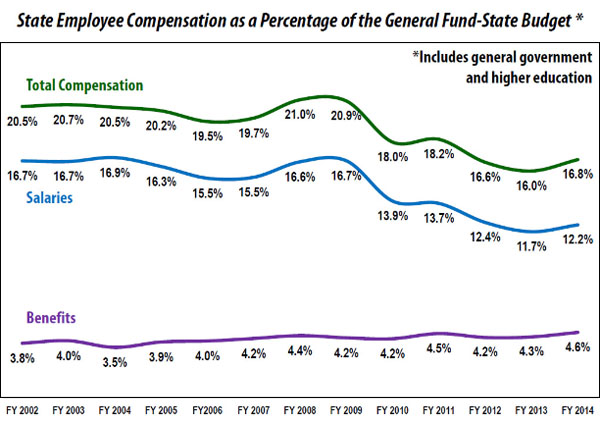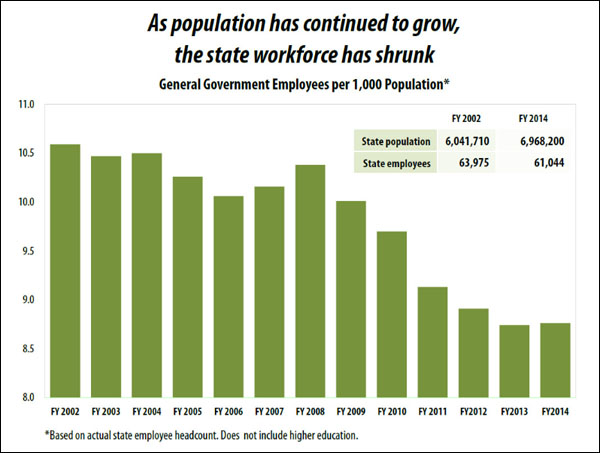STATE GOVERNMENT
Inslee’s budget funds 1st state pay hikes in 7 years
 OLYMPIA (Dec. 19, 2014) — Gov. Jay Inslee proposed a two-year budget on Thursday that funds all of the negotiated pay raises ratified by state employees this fall. For most, it would be the first general wage increases since 2008 — the longest state employees have gone without one since at least 1960.
OLYMPIA (Dec. 19, 2014) — Gov. Jay Inslee proposed a two-year budget on Thursday that funds all of the negotiated pay raises ratified by state employees this fall. For most, it would be the first general wage increases since 2008 — the longest state employees have gone without one since at least 1960.
“Far too long state employees have gone without a cost-of-living adjustment as the state has struggled to recover from the ‘Great Recession’,” said Jeff Johnson, President of the Washington State Labor Council, AFL-CIO. “Governor Inslee, recognizing the hard work and sacrifice of state employees, has negotiated an average 4.8 percent COLA for general state employees over the next biennium. Now it is the legislature’s turn to recognize and value state employees.”
“The recession took a big bite out of state employee take-home pay,” reads the governor’s budget statement on state employees: “In fact, during the 2011-13 biennium, state employees agreed through collective bargaining to take a temporary 3 percent pay cut to help the state through the Great Recession.”
Meanwhile, state employees continue to pay a larger share of their benefit costs. By 2017, the average employee contribution to medical coverage will be about $176 per month, compared to less than $28 per month in 2001. Employees in the PERS 2 and TRS 2 retirement systems have seen their contribution rates increase from less than 1 percent in 2002 to about 6 percent for the next biennium.
Inslee is recommending that the state fund the modest cost-of-living adjustments (COLAs) negotiated and ratified this year by public employee unions’ bargaining teams. For most employees at state agencies, public schools and in higher education, it would be a 3 percent increase on July 1, 2015, and 1.8 percent on July 1, 2016. Some unions’ contracts may have additional compensation. (See his 2015-17 compensation plan outlining pay increases for the various state employee groups.)
The Washington Federation of State Employees, Council 28 reports that Inslee’s budget proposes funding the new Health Care Agreement that goes in all contracts. This affects premium costs in 2016 and 2017. The Health Care Agreement would continue the current premium split under which the state pays an average of 85 percent and the employee pays an average of 15 percent.
The governor noted that in recent years state employees have been asked to do much more with less. Since the great recession, the state government has been providing more services to more people, but with with fewer employees.
“In 2001, there were nearly 6 million people in Washington and about 64,000 state general government employees,” reads the governor’s statement. “Today, Washington’s population is nearly 7 million and general government employees total about 61,000. Put another way: We have 1 million more people being served by 3,000 fewer state employees.”
“This budget begins to address the decades of disinvestment in education,” reads a news release from AFT Washington, but even more must be done:
We are concerned that his proposal doesn’t adequately invest in higher education. The tuition freeze makes college more affordable and accessible, but without additional state investment to make up for previous budget cuts, we will be challenged to maintain a high-quality system.
SEIU HealthCare 1199NW released a statement Thursday praising Inslee for proposing “a budget that reflects our shared values:”
It is time to make investments in healthy communities and this budget is a sustainable and equitable way forward. Years of cuts to human services and budgets funded by regressive and insufficient revenues have left us with a mental health system that denies patients their rights and communities the care they need.
The governor’s budget plan now goes to the State Legislature, which convenes on Jan. 12. In the coming day,s unions representing state employees will be combing through the details of the budget and working to urge legislators not only to fund Inslee’s proposed compensation package, but also to preserve quality public services throughout the state.
“Despite these positive signs, it is still up to the Legislature to approve the contracts,” the Washington Public Employees Association/UFCW 365 told members. “It’s important to continue to fight for the first cost-of-living increases since 2008.”







